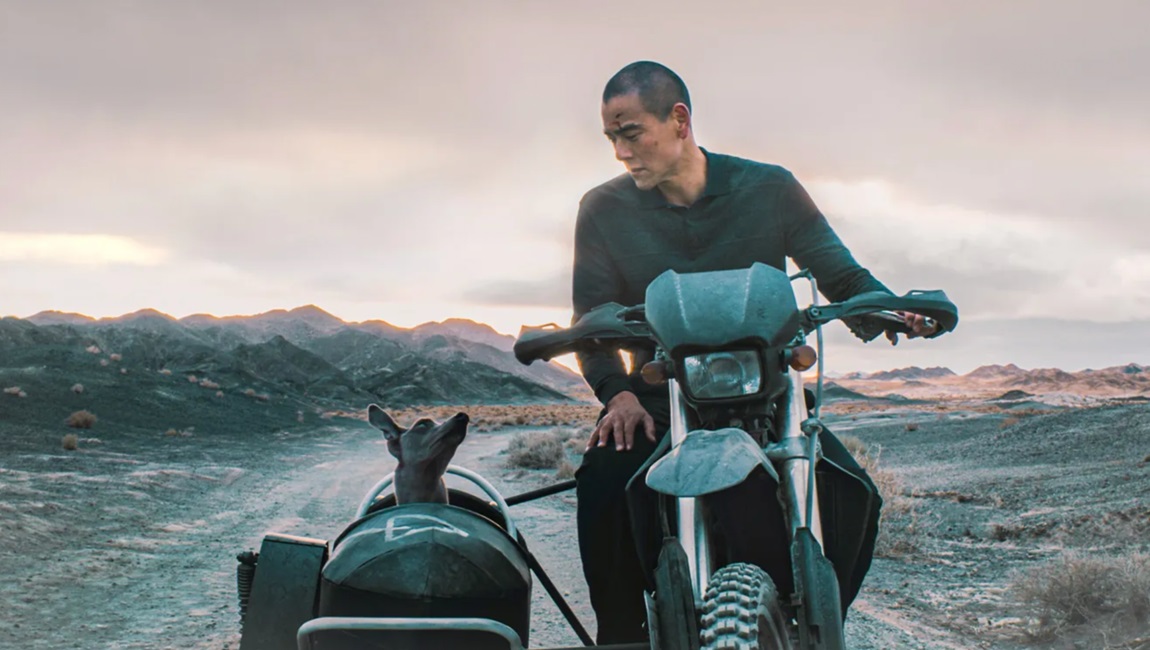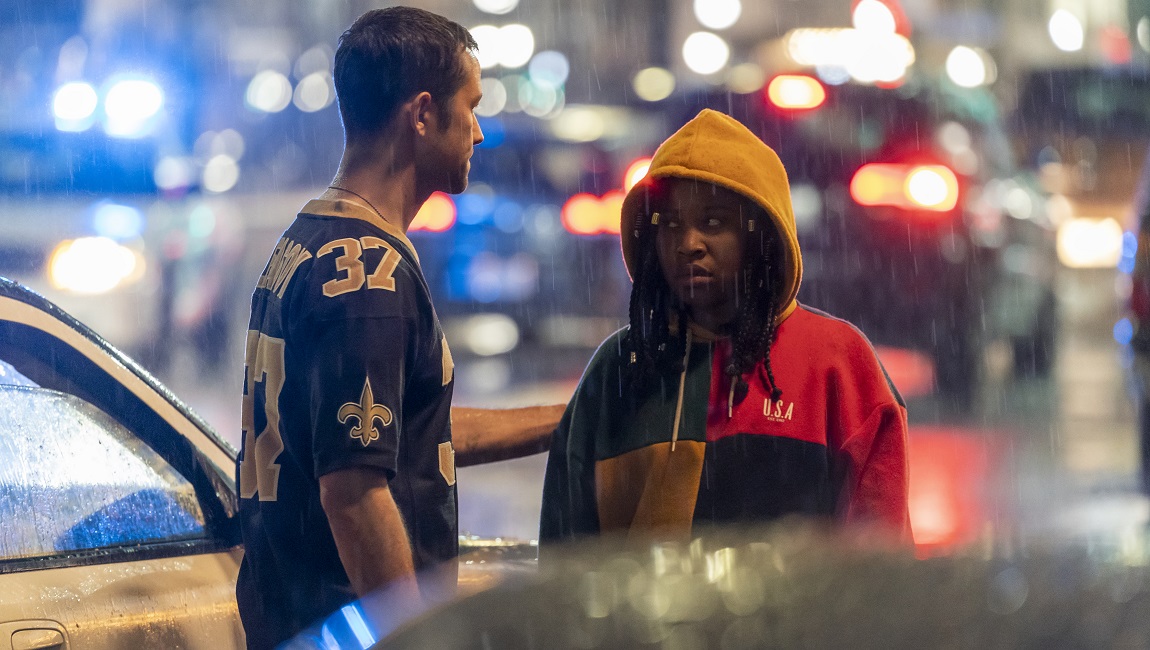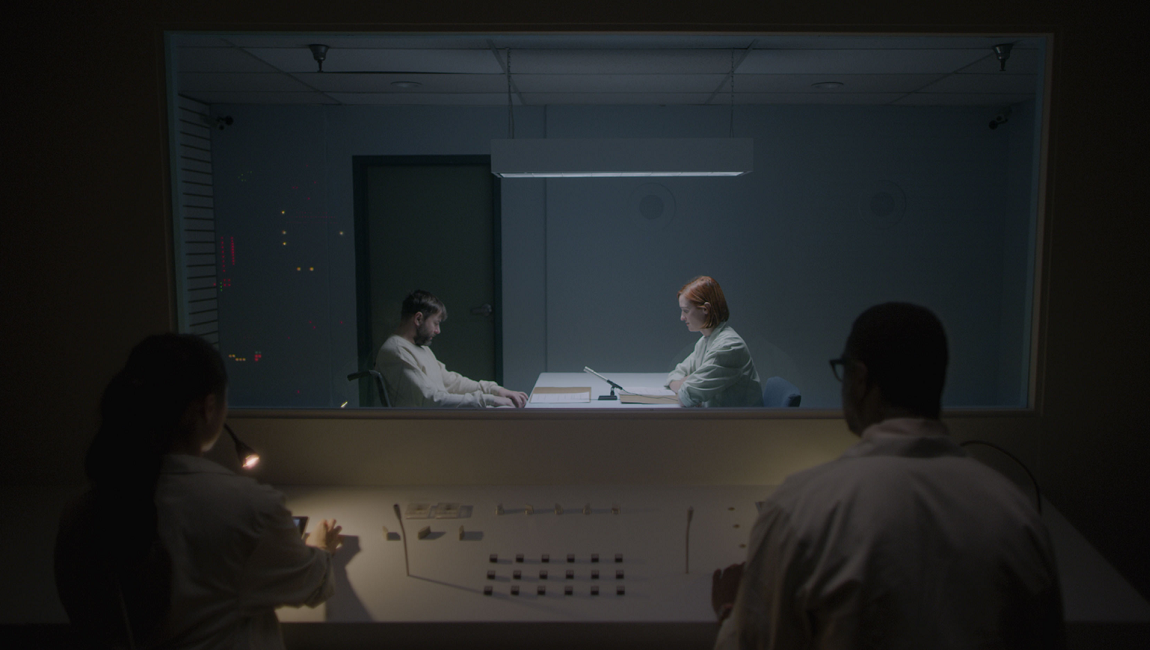If dogs run free, then what must be
Must be, and that is all
True love can make a blade of grass
Stand up straight and tall
In harmony with the cosmic sea
True love needs no company
It can cure the soul, it can make it whole
If dogs run free
— Bob Dylan, “If Dogs Run Free”
Guan Hu’s Black Dog is playing in the Un Certain Regard program at Cannes, so it isn’t eligible for the Palme d’Or, but it should be a strong contender for the Palm Dog, especially if that award had a special prize for ensemble work. The film begins in a desert, the edge of the Gobi in northwestern China. A bus traveling along a dusty road is charged by a herd of wild dogs, crashing the bus but thankfully injuring no one (dog or human). In the ensuing chaos we meet Lang (Eddie Peng), an ex-con returning home after doing time for something involving a wrongful death. It seems he was a local celebrity at one time, a kind of rock star, but now he’s turned inward and sullen, hardly ever speaking. In fact, he probably urinates outside more than he speaks during the film’s first 20 minutes or so.
On one of these micturition excursions, he encounters the eponymous Black Dog. Lang’s hometown has fallen on hard times in recent years, the oil operation that once powered it having moved on, and the town has become a dusty collection of abandoned Mao-era concrete structures: apartment buildings, factories, a zoo. As the people moved away, they left their dogs behind. Those dogs have formed massive roving packs, ruling the streets and the surrounding countryside. One in particular has become the target of fear: the Black Dog has reportedly bit several people and is thought to be rabid — there’s a hefty reward for his capture.
Thus begins a classic story of male friendship. At first, Lang, out to capture the dog, is his enemy and his victim. He does eventually capture the dog, but a friend, fearing that Lang has contracted rabies, forces the two of them to hole up together in Lang’s house (after a certain amount of time, if the dog’s still alive, then Lang too will be OK). Shut in together, the two bond and become inseparable buddies for the rest of the film, the plot of which revolves loosely around the uncle of the guy who Lang may have killed trying to get revenge on him and also a woman who works for the circus traveling through town, with whom Lang may spark a relationship (played by Tong Liya, from the Detective Chinatown movies).
Black Dog is a kind of return to form for director Guan Hu. A member of the Sixth Generation of Chinese filmmakers who got their start in the late ‘90s, Guan has only been able to complete one feature since his 2015 hit Mr. Six. That was the benighted war film The Eight Hundred, whose protracted, censorship-plagued release schedule was a topic of much speculation in 2019 and 2020. By design a propaganda film about Chinese resistance to the Japanese in the early days of World War II, the film ran into trouble because the soldiers it valorized were from the wrong Chinese army, representing the Nationalist Kuomintang rather than the Communist Party. The director is on surer ground with Black Dog, a light minimalist satire that revisits familiar Sixth Generation terrain; namely, the fraught situations of workers and small towns as China economically blossomed in the years leading up to the 2008 Beijing Olympics. Black Dog is set on the eve of those Games, which also happened to coincide with a total solar eclipse, the ideal location of which to observe was just outside of Lang’s hometown (the film gives the town the name “Chixia,” though two towns of that name can be found near the border of the Gobi on Google Maps, and it’s not clear which, if either, is the one Guan has in mind).
As Lang roams through his dusty town, Guan keeps his distance. Literally: almost the entire movie is composed of the kind of long shots that were the hallmark of a certain strain of early-2000s Sixth Generation filmmaking (especially those of Guan’s peer Jia Zhangke, who plays a small role in Black Dog (a variation on his “Boss Jia” persona from a few of his own films) as the man in charge of rounding up all the stray dogs. And speaking of, the Black Dog (played by a greyhound named Xiao Xin, who was adopted along with two other dogs that worked on the film by Eddie Peng) seems to actually get more close-ups than Guan’s human star, a somewhat perverse decision given that Peng is the most charismatic leading man Chinese cinema has produced in the 21st century. Originally from Taiwan (though he attended high school and college in Vancouver), Peng has been a competent action star in movies like Rise of the Legend and Call of Heroes, has played charming rogues in Ann Hui’s war film Our Time Will Come and Jiang Wen’s Hidden Man, and is excellent in a comic role in Han Han’s time travel comedy Duckweed. Guan’s long shots serve a purpose, of course, isolating Peng in the dusty, dilapidated landscape of the town (as well as the vast deserts and mountains of the areas outside of it), and providing ample space for the herds of other dogs to roam through the set. And it makes sense too for Peng’s character: withdrawn, remote, only really able to bond with a dog, denying us his movie star smile is necessary for the film to work at all.
And yet, Black Dog is most effective when Guan is at his most whimsical: a Chekov’s movie poster on the wall of Lang’s house looks ahead to multiple uses of Pink Floyd’s The Wall on the soundtrack; the abandoned zoo maintained by Lang’s father, featuring a handful of random animals that may have just wandered in from the Gobi (a camel, a monkey, a goat) but also a beautiful tiger, all of whom are eventually joined by many many dogs; and some magical eclipse and Opening Ceremony sequences. Black Dog isn’t particularly sophisticated or novel in its metaphor or social analysis. We’ve seen these towns and characters before, the detritus of one industry in the process of being plowed under for the next phase, with the people who live and work in those spaces forced to adapt as best they can or move on (like the circus) to the next town. But Black Dog works as well as it does because the minimalist camerawork and pacing creates an ideal tension with the film’s inherently goofy premise. And under it all is real love (of animals) and disappointment (in people). Guan inflicts all the violence and beauty of nature onto those forces of economic progress, the world itself joining the fight against the capitalist developers and petty gangsters (who amount to much the same thing) that try to run things. Earthquakes and hailstorms, wild beasts and snakes on the loose. Lang, in the end, can be redeemed by his friendship with the Black Dog. But the town, it’ll have to fend for itself.
Published as part of Cannes Film Festival 2024 — Dispatch 2.







